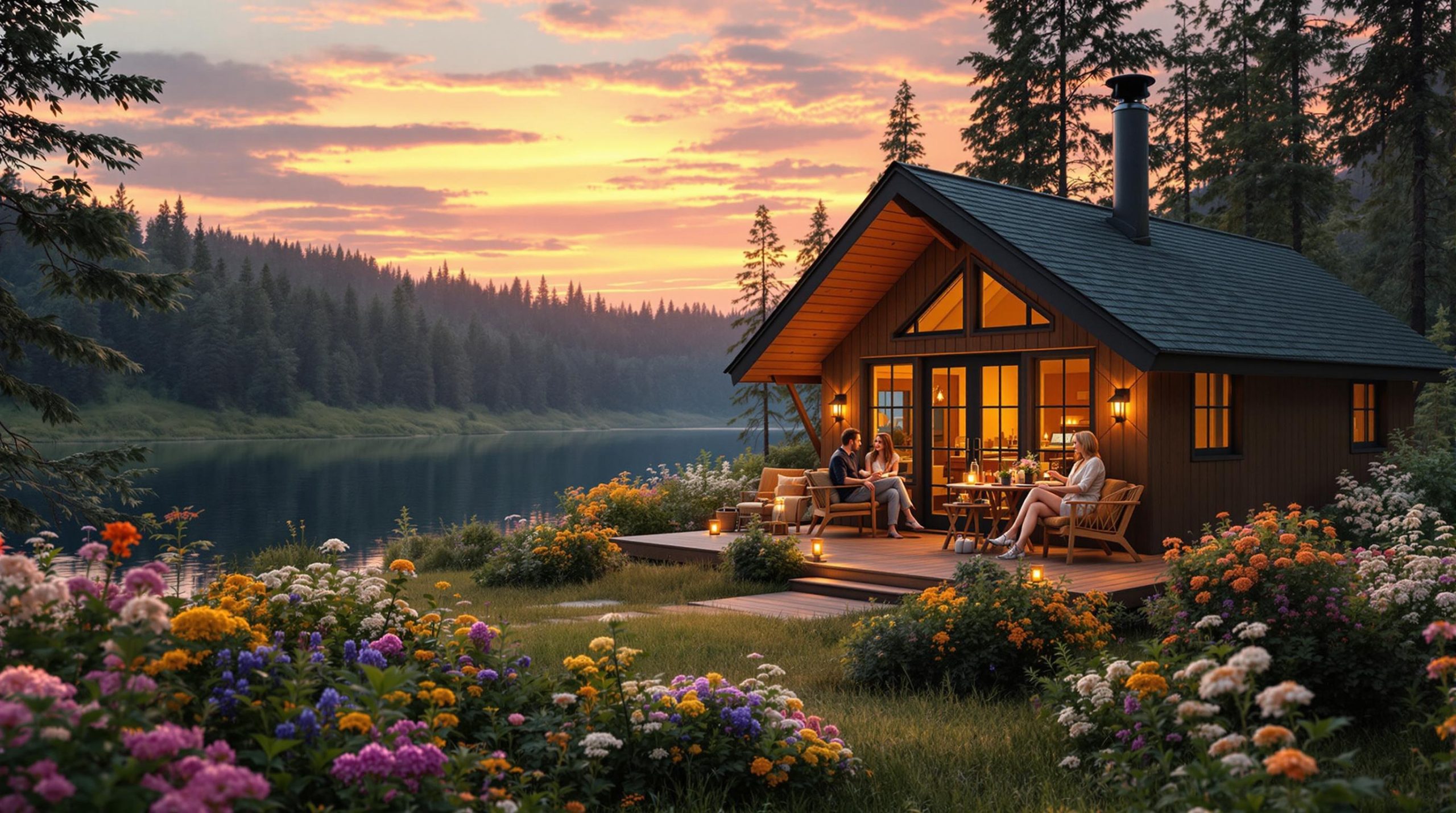Did you know that 83% of travelers care about sustainable travel, and 78% of singles find environmental awareness attractive in a partner? If you're in the travel business, this is your chance to tap into a growing market: eco-friendly romantic getaways.
Key Takeaways:
- Green Travel Growth: The eco-friendly travel market is growing at 9.87% annually (2023–2029), led by Millennials seeking meaningful, low-impact experiences.
- What Couples Want:
- Eco-Friendly Lodging: LEED-certified properties like Bardessono.
- Local Experiences: Farm-to-table dining and cultural tours.
- Nature-Focused Stays: Glamping or nature-based activities.
- How to Market:
- Highlight sustainability certifications (LEED, Green Seal).
- Partner with local businesses for authentic offerings.
- Use digital tools like eco-travel platforms and influencers.
- Track Impact: Measure energy, water, waste, and emissions to improve and prove your green efforts.
Why It Matters:
With tourism contributing 8–10% of global greenhouse gas emissions, the shift to eco-friendly travel is both a demand and an opportunity. By combining romance with sustainability, businesses can attract eco-conscious couples while reducing their environmental footprint. Ready to create green romance packages that stand out? Read on for actionable strategies.
Regenerative Marketing: Crafting Luxury Travel Experiences Beyond Sustainability
Creating Green Romance Packages
Tap into the growing interest in eco-conscious travel by crafting packages that combine romance with sustainable practices.
Green Hotels and Facilities
Start with eco-friendly accommodations as the backbone of your sustainable romance packages. Properties certified by Green Seal, for instance, excel in reducing their environmental impact. Certified hotels can save up to 10 million gallons of water annually and cut CO₂ emissions by as much as 55%.
Key features to look for include:
| Feature | Benefit | Example Property |
|---|---|---|
| Energy Conservation | Lowers energy consumption | Hilton Austin Airport: LED lighting, smart thermostats |
| Water Management | Conserves local water resources | Eco hotels with gray-water recycling systems |
| Waste Reduction | Reduces landfill waste | Dexamenes Hotel: extensive recycling program |
| Local Sourcing | Boosts local economy | Hotels offering organic, locally sourced dining |
These features create a foundation for romance packages that are both luxurious and eco-conscious.
Nature-Based Activities
Incorporate activities that immerse couples in nature while promoting sustainability. Take inspiration from LooLa Eco Adventure in Bintan, Indonesia, which offers experiences like sunset kayaking tours and mangrove planting sessions. This approach has earned them accolades such as Asia's #1 Eco Resort (2012) and World's #1 Responsible Tourism Operator (2015).
Ideas for nature-based activities include:
- Guided forest bathing sessions for relaxation and mindfulness
- Nature walks scheduled for optimal wildlife observation
- Romantic setups in natural settings, like secluded beaches or forest clearings
- Activities designed to minimize ecological impact
Local Business Partnerships
Supporting local businesses adds authenticity and sustainability to romance packages. For example, the Northern American Indian Pueblos in New Mexico grew tourism businesses from 45 to 91 in just ten years while preserving cultural heritage.
Ways to collaborate with local businesses:
- Work with organic farms to provide farm-to-table dining experiences
- Partner with indigenous guides to offer cultural tours
- Source welcome gifts from local artisans using sustainable materials
- Team up with eco-certified tour operators for unique couple activities
"Because we are Green Seal certified, we are guaranteed to have green meetings. Big companies, government, and associations are making it a requirement." - Kendra L. Araujo, Director of Sales and Marketing at Hilton Austin Airport
Promoting Green Practices
Highlighting Sustainability Credentials
Showcase well-known sustainability certifications to build trust with your audience. Credentials from organizations like LEED, Green Key, and EarthCheck validate efforts in areas like energy efficiency, water conservation, and community engagement. Make these certifications visible - feature their logos prominently on your homepage and booking materials. Include brief explanations of how these achievements enhance guest experiences and reflect your commitment to eco-friendly practices.
Explaining Your Green Efforts
Once your certifications are in place, help guests understand their significance. Break down your green initiatives in simple, relatable terms. Share measurable benefits, outline your environmental impact, and explain your sustainability processes. Highlight ways guests can participate, such as through partnerships with local conservation projects. A dedicated section on your website can effectively communicate your eco-friendly efforts and show transparency.
Boosting Visibility Online
Use digital channels to amplify your eco-friendly message and connect with eco-conscious travelers. Update your profiles on travel platforms to emphasize sustainable features that appeal to environmentally aware audiences. Platforms like LOVU.Travel offer tools like featured posts, homepage placements, social media campaigns, and targeted emails to spotlight your green initiatives. These strategies enhance your digital presence and help position your business as a go-to choice for eco-minded couples.
sbb-itb-b2feea3
Marketing Green Getaways
Travel Platform Listings
Start by showcasing your property's natural beauty and eco-friendly features with high-quality photos. Use specific keywords like "eco-friendly resort," "sustainable honeymoon," or "green romantic getaway" to make your listing more visible to eco-conscious travelers.
Consider using LOVU.Travel's Power Pack ($199/month) for regular homepage placements and posts that emphasize your property's sustainable qualities. Include any environmental certifications in your descriptions and share measurable achievements to highlight your dedication to green practices. To expand your reach, create content that tells a compelling eco-friendly story about your property.
Green Travel Content
Support your listings with engaging content that strengthens your green travel message. Focus on topics like:
- Blog posts about local conservation projects
- Videos featuring farm-to-table dining experiences
- Photo collections of wildlife encounters
- Highlights of nature-based activities
If you collaborate with local organic farmers or community programs, create videos showcasing these partnerships and their impact on sustainable tourism.
Eco-Influencer Outreach
Once your digital content is in place, work with influencers to spread your sustainable travel message. Partner with eco-influencers who focus on promoting green practices. These collaborations could include activities like participating in local conservation efforts or showcasing immersive sustainable travel experiences.
To maximize the reach of influencer content, use LOVU.Travel's Ultimate Deal package ($199/month). This service promotes influencer posts through the platform's social media channels and email campaigns, helping you connect with environmentally conscious couples planning romantic getaways.
Measuring Green Impact
Tracking the impact of your eco-friendly initiatives is crucial for maintaining progress. By measuring your property's environmental footprint, you can back up your claims and identify areas for improvement. These strategies work hand-in-hand with guest feedback and regular program revisions.
Key Performance Metrics
Keep an eye on these metrics to assess your environmental efforts. They directly support your green practices:
- Energy consumption: Record monthly kWh usage and associated costs.
- Water usage: Measure water consumption per guest night.
- Waste management: Track how much waste is reduced and recycled.
- Carbon emissions: Calculate emissions from guest transportation. For example, first-class flights produce up to 140 times more CO₂ than train travel.
A sustainability dashboard, like the MEET Network's Ecological Footprint Calculator, can help you monitor these metrics effectively.
Guest Input Collection
Guest feedback is a powerful resource for identifying areas that need improvement.
"Guest feedback is a valuable tool for hoteliers that offers many benefits. It enables the optimization of internal processes, increases guest satisfaction, and promotes a positive reputation".
Use surveys and online forms to gather insights from guests, ensuring your efforts align with their expectations and sustainability goals.
Program Updates
Leverage guest feedback to keep your programs effective and relevant. Regular reviews ensure your green initiatives stay on track.
Short-term actions:
- Monitor destination management practices every month.
- Evaluate new service providers for compliance with sustainability standards.
- Update guest materials with the latest metrics and achievements.
Long-term focus:
- Perform in-depth environmental impact assessments.
- Invest in advanced eco-friendly technologies.
- Adjust sustainability goals based on collected data.
Tools like the Social Impact Assessment can help measure both environmental and community benefits, ensuring you maintain high standards while enhancing the guest experience.
Conclusion
Promoting eco-friendly romantic getaways is more than just a passing fad - it’s a lucrative business opportunity supported by solid data. For instance, 83% of travelers value sustainable travel, and 78% of singles are drawn to partners who prioritize environmental care. These stats highlight a growing demand that can translate into real profits.
Take Eliamos Villas Hotel & Spa in Kefalonia as an example. By using solar energy and offering locally sourced dining, they’ve not only improved guest satisfaction but also cut operational costs - showing how sustainability can enhance both experience and efficiency.
Experts back this approach:
"Sustainable travel marketing is not just a trend; it is a powerful tool for driving positive change." – 5W PR Agency Blog
The global reach of this market is undeniable. Europe leads with a 32% market share, while North America and Asia Pacific follow closely at 28% each. This distribution underscores the worldwide potential for eco-friendly tourism ventures.
For travel providers, being genuine is key. With 85% of women stating that caring for the planet is an important trait in a partner, properties that openly showcase energy-saving practices or partnerships with local artisans are more likely to connect with eco-conscious couples.
The tourism industry’s contribution to 8–10% of global greenhouse gas emissions presents both a challenge and a chance to innovate. Companies like Havila Voyages are raising the bar with zero-emission cruise ships, proving that sustainable practices can also enhance brand credibility.


No Comments.